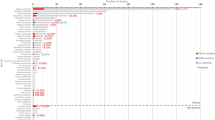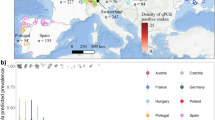Abstract
The relevance of wild hosts in the maintenance and transmission of animal tuberculosis may increase as the prevalence in livestock decreases. However, studies on wild mammals in low bovine tuberculosis prevalence scenarios are scarce. The Basque Country is an understudied region from the Atlantic Iberian Peninsula with low bovine tuberculosis prevalence. In this 10-year survey, we searched for Mycobacterium tuberculosis complex (MTC) infection in wildlife and studied the spatial and temporal distribution of the spoligotypes circulating among these wild species and cohabiting livestock. For these purposes, lymph nodes from 1472 wild mammals were cultured and isolates spoligotyped. Information on domestic tuberculosis cases was obtained from the Spanish Database of Animal Mycobacteriosis. Infection was confirmed in ten wild boar (1.12%; 95% CI 0.61–2.05) and four red deer (2.40%; 95% CI 0.94–6.00). MTC was not isolated from badgers or other wild species. The general spoligotype diversity in the region was high. Five distinct spoligotypes belonging to M. bovis (SB0121, SB0134, SB0881, SB2354, SB1086) and one to M. caprae (SB0415) were detected in wildlife. Wild ungulates harboured most of the M. bovis spoligotypes that were commonly found in cattle, being SB0121 and SB0134 geographically associated between wild boar and cattle. M. caprae SB0415 was also found in both wild species as well as in cattle and goats. Despite the absence of MTC-infected badgers and the overall low prevalence observed in wildlife, potential epidemiological links between cattle and wild boar have been revealed. No competent hosts should be ignored when developing global control strategies aimed at eradicating tuberculosis.


Similar content being viewed by others
Data availability
All relevant data are within the manuscript.
References
Acevedo P, Prieto M, Quirós P, Merediz I, de Juan L, Infantes-Lorenzo JA, Triguero-Ocaña R, Balseiro A (2019) Tuberculosis epidemiology and badger (Meles meles) spatial ecology in a hot-spot area in Atlantic Spain. Pathogens 8:1–18. https://doi.org/10.3390/pathogens8040292
Amato B, Di Marco Lo Presti V, Gerace E et al (2018) Molecular epidemiology of Mycobacterium tuberculosis complex strains isolated from livestock and wild animals in Italy suggests the need for a different eradication strategy for bovine tuberculosis. Transbound Emerg Dis 65:e416–e424. https://doi.org/10.1111/tbed.12776
Amato B, Mignacca SA, Pacciarini ML, Vitale M, Antoci S, Cucinotta S, Puleio R, Biasibetti E, Fiasconaro M, Capucchio MT, di Marco Lo Presti V (2016) An outbreak of bovine tuberculosis in a fallow deer herd (Dama dama) in Sicily. Res Vet Sci 106:116–120. https://doi.org/10.1016/j.rvsc.2016.03.019
Balseiro A, González-Quirós P, Rodríguez Ó, Francisca Copano M, Merediz I, de Juan L, Chambers MA, Delahay RJ, Marreros N, Royo LJ, Bezos J, Prieto JM, Gortázar C (2013) Spatial relationships between Eurasian badgers (Meles meles) and cattle infected with Mycobacterium bovis in Northern Spain. Vet J 197:739–745. https://doi.org/10.1016/j.tvjl.2013.03.017
Balseiro A, Orusa AOR, Robetto S et al (2009) Tuberculosis in roe deer from Spain and Italy. Vet Rec 164:468–470. https://doi.org/10.1136/vr.164.15.468
Balseiro A, Rodríguez O, González-Quirós P, Merediz I, Sevilla IA, Davé D, Dalley DJ, Lesellier S, Chambers MA, Bezos J, Muñoz M, Delahay RJ, Gortázar C, Prieto JM (2011) Infection of Eurasian badgers (Meles meles) with Mycobacterium bovis and Mycobacterium avium complex in Spain. Vet J 190:e21–e25. https://doi.org/10.1016/j.tvjl.2011.04.012
Boadella M, Acevedo P, Vicente J, Mentaberre G, Balseiro A, Arnal MC, Martínez D, García-Bocanegra I, Casal C, Álvarez J, Oleaga Á, Lavín S, Muñoz M, Sáez-Llorente JL, de la Fuente J, Gortázar C (2011) Spatio-temporal trends of Iberian wild boar contact with Mycobacterium tuberculosis complex detected by ELISA. Ecohealth 8:478–484. https://doi.org/10.1007/s10393-011-0713-y
Boniotti MB, Gaffuri A, Gelmetti D, Tagliabue S, Chiari M, Mangeli A, Spisani M, Nassuato C, Gibelli L, Sacchi C, Zanoni M, Pacciarini ML (2014) Detection and molecular characterization of Mycobacterium microti isolates in wild boar from northern Italy. J Clin Microbiol 52:2834–2843. https://doi.org/10.1128/JCM.00440-14
Fitzgerald SD, Kaneene JB (2013) Wildlife reservoirs of bovine tuberculosis worldwide: hosts, pathology, surveillance and control. Vet Pathol 50:488–499. https://doi.org/10.1177/0300985812467472
García-Jiménez WL, Benítez-Medina JM, Fernández-Llario P, Abecia JA, García-Sánchez A, Martínez R, Risco D, Ortiz-Peláez A, Salguero FJ, Smith NH, Gómez L, Hermoso de Mendoza J (2013) Comparative pathology of the natural infections by Mycobacterium bovis and by Mycobacterium caprae in wild boar (Sus scrofa). Transbound Emerg Dis 60:102–109. https://doi.org/10.1111/j.1865-1682.2012.01321.x
Gortázar C, Delahay RJ, Mcdonald RA et al (2012) The status of tuberculosis in European wild mammals. Mamm Rev 42:193–206. https://doi.org/10.1111/j.1365-2907.2011.00191.x
Gortázar C, Diez-Delgado I, Barasona JA et al (2015) The wild side of disease control at the wildlife-livestock-human interface: a review. Front Vet Sci 1:1–12. https://doi.org/10.3389/fvets.2014.00027
Kamerbeek J, Schouls L, Kolk A, van Agterveld M, van Soolingen D, Kuijper S, Bunschoten A, Molhuizen H, Shaw R, Goyal M, van Embden J (1997) Simultaneous detection and strain differentiation of Mycobacterium tuberculosis for diagnosis and epidemiology. J Clin Microbiol 35:907–914
Kaneene JB, Pfeiffer D (2006) Epidemiology of Mycobacterium bovis. In: Mycobacterium Bovis infection in animals and humans. Second Edition. pp 34–48
Lambert S, Hars J, Réveillaud E, Moyen JL, Gares H, Rambaud T, Gueneau E, Faure E, Boschiroli ML, Richomme C (2017) Host status of wild roe deer in bovine tuberculosis endemic areas. Eur J Wildl Res 63:15. https://doi.org/10.1007/s10344-016-1071-4
Lopes dos Reis AC (2015) On the trail of Mycobacterium avium subsp. paratuberculosis and Mycobacterium bovis in mainland Portugal: a microbiological and molecular survey in wildlife. Dissertation. Universidade de Lisboa
Mentaberre G, Romero B, De Juan L et al (2014) Long-term assessment of wild boar harvesting and cattle removal for bovine tuberculosis control in free ranging populations. PLoS One 9:1–12. https://doi.org/10.1371/journal.pone.0088824
Michelet L, de Cruz K, Phalente Y et al (2016) Mycobacterium microti infection in dairy goats, France. Emerg Infect Dis 22:569–570. https://doi.org/10.3201/eid2203.151929
Michelet L, De Cruz K, Zanella G et al (2015) Infection with Mycobacterium microti in animals in France. J Clin Microbiol 53:981–985. https://doi.org/10.1128/JCM.02713-14
Ministerio de Agricultura Pesca y Alimentación (2020) Programa Nacional de Erradicación de Tuberculosis Bovina presentado por España para el año 2020. https://www.mapa.gob.es/es/ganaderia/temas/sanidad-animal-higiene-ganadera/pnetb_2020final_tcm30-523317.pdf
Muñoz-Mendoza M, Marreros N, Boadella M, Gortázar C, Menéndez S, de Juan L, Bezos J, Romero B, Copano M, Amado J, Sáez J, Mourelo J, Balseiro A (2013) Wild boar tuberculosis in Iberian Atlantic Spain: a different picture from Mediterranean habitats. BMC Vet Res 9:176. https://doi.org/10.1186/1746-6148-9-176
Pérez de Val B, Sanz A, Soler M, Allepuz A, Michelet L, Boschiroli ML, Vidal E (2019) Mycobacterium microti infection in free-ranging wild boar, Spain, 2017-2019. Emerg Infect Dis 25:2152–2154. https://doi.org/10.3201/eid2511.190746
Réveillaud É, Desvaux S, Boschiroli M-L, Hars J, Faure É, Fediaevsky A, Cavalerie L, Chevalier F, Jabert P, Poliak S, Tourette I, Hendrikx P, Richomme C (2018) Infection of wildlife by Mycobacterium bovis in France Assessment Through a National Surveillance System, Sylvatub. Front Vet Sci 5:1–16. https://doi.org/10.3389/fvets.2018.00262
Richomme C, Boadella M, Courcoul A, Durand B, Drapeau A, Corde Y, Hars J, Payne A, Fediaevsky A, Boschiroli ML (2013) Exposure of wild boar to Mycobacterium tuberculosis complex in France since 2000 is consistent with the distribution of bovine tuberculosis outbreaks in cattle. PLoS One 8:1–7. https://doi.org/10.1371/journal.pone.0077842
Rodriguez-Campos S, González S, de Juan L, Romero B, Bezos J, Casal C, Álvarez J, Fernández-de-Mera IG, Castellanos E, Mateos A, Sáez-Llorente JL, Domínguez L, Aranaz A (2012) A database for animal tuberculosis (mycoDB.es) within the context of the Spanish national programme for eradication of bovine tuberculosis. Infect Genet Evol 12:877–882. https://doi.org/10.1016/J.MEEGID.2011.10.008
Sahraoui N, Müller B, Guetarni D, Boulahbal F, Yala D, Ouzrout R, Berg S, Smith NH, Zinsstag J (2009) Molecular characterization of Mycobacterium bovis strains isolated from cattle slaughtered at two abattoirs in Algeria. BMC Vet Res 5:1–7. https://doi.org/10.1186/1746-6148-5-4
Serrano M, Sevilla IA, Fuertes M, Geijo M, Risalde MÁ, Ruiz-Fons JF, Gortazar C, Juste RA, Domínguez L, Elguezabal N, Garrido JM (2018) Different lesion distribution in calves orally or intratracheally challenged with Mycobacterium bovis: implications for diagnosis. Vet Res 49:1–10. https://doi.org/10.1186/s13567-018-0566-2
Sevilla IA, Molina E, Tello M, Elguezabal N, Juste RA, Garrido JM (2017) Detection of mycobacteria by culture and DNA-based methods in animal-derived food products purchased at Spanish supermarkets. Front Microbiol 8:1–10. https://doi.org/10.3389/fmicb.2017.01030
Varela-Castro L, Alvarez V, Sevilla IA, Barral M (2020) Risk factors associated to a high Mycobacterium tuberculosis complex seroprevalence in wild boar (Sus scrofa) from a low bovine tuberculosis prevalence area. PLoS One 15:1–15. https://doi.org/10.1371/journal.pone.0231559
Varela-Castro L, Torrontegi O, Sevilla IA, Barral M (2020) Detection of wood mice (Apodemus sylvaticus) carrying non-tuberculous mycobacteria able to infect cattle and interfere with the diagnosis of bovine tuberculosis. Microorganisms 8:1–13. https://doi.org/10.3390/microorganisms8030374
Acknowledgements
We thank the Provincial Councils of Araba, Bizkaia and Gipuzkoa, the hunters and the wildlife recovery centres for the effort they made to provide us the samples. We also want to thank Elena Molina, Maitane Tello, Amaia Etxezarreta and Mertxe Bascones for her collaboration with the laboratory work, as well as to Joseba M. Garrido for his expertise and assistance throughout the study.
Code availability
N/A
Funding
This investigation received financial support from the National Institute for Agricultural and Food Research and Technology (INIA) (Research Project RTA2014-00002-C02-02) and the Basque Government. LV holds a pre-doctoral fellowship from the National Institute for Agricultural and Food Research and Technology (INIA) (CPD2016-0006).
Author information
Authors and Affiliations
Contributions
Conceptualization: Marta Barral, Iker A Sevilla and Lucía Varela-Castro. Methodology: Marta Barral, Iker A Sevilla, Xeider Gerrikagoitia, Vega Alvarez and María V. Geijo. Formal analysis and investigation: Marta Barral, Iker A Sevilla and Lucía Varela-Castro. Writing-original draft preparation: Lucía Varela-Castro, Marta Barral and Iker A Sevilla. Writing-review and editing: Lucía Varela-Castro, Marta Barral, Iker A Sevilla, Xeider Gerrikagoitia, Vega Alvarez and María V. Geijo. Funding acquisition: Marta Barral. Resources: Marta Barral and Iker A Sevilla. Supervision: Marta Barral and Iker A Sevilla.
Corresponding author
Ethics declarations
Ethics approval
Samples used in this study were obtained by competent local authorities from legally hunted animals or from carcasses found in the field, in complete agreement with Spanish and European regulations. No animals were killed specifically for this study. No ethical approval was deemed necessary.
Consent to participate
All authors gave their consent to participate in this study.
Consent for publication
All authors approved the final manuscript and gave their consent for its publication.
Competing interests
The authors declare no competing interests.
Additional information
Publisher’s note
Springer Nature remains neutral with regard to jurisdictional claims in published maps and institutional affiliations.
Rights and permissions
About this article
Cite this article
Varela-Castro, L., Gerrikagoitia, X., Alvarez, V. et al. A long-term survey on Mycobacterium tuberculosis complex in wild mammals from a bovine tuberculosis low prevalence area. Eur J Wildl Res 67, 43 (2021). https://doi.org/10.1007/s10344-021-01489-z
Received:
Revised:
Accepted:
Published:
DOI: https://doi.org/10.1007/s10344-021-01489-z




